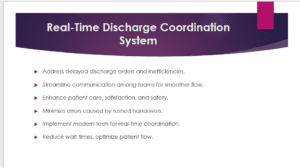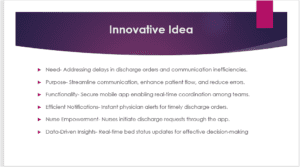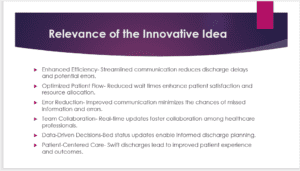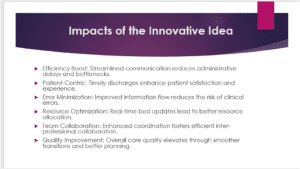Disseminate an Innovate Proposal

Hello, and welcome to the presentation on the Real-Time Discharge Coordination System. Today, we’ll explore a novel approach to the problems posed by delayed discharge orders and communication breakdowns in our post-operative ward. In this talk, we’ll examine how this system can transform our productivity, improve patient care, and streamline communication.

This introduction introduces the novel idea of a “Real-Time Discharge Coordination System” as a remedy for the problems caused by postponed discharge orders. The innovation targets to improve the overall flow of patient care, resulting in higher levels of satisfaction and safety, by streamlining communication across diverse teams. Real-Time Discharge Coordination System also aims to reduce errors through effective coordination because errors brought on by impatience and hurried handovers frequently result in them. Real-time communication is made possible by incorporating current technology, which ultimately results in shorter wait times and better patient flow overall (Benevento et al., 2021).

The issue of delayed discharge orders and disjointed communication is directly addressed by the “Real-Time Discharge Coordination System” (Smith et al., 2022). The need for such a breakthrough is made clear by the lengthy stays and potential mistakes brought on by poor communication. The invention aims to improve patient flow, create seamless communication channels, and raise the standard of care as a whole. A secure mobile app would be used to operate this system, providing immediate physician alerts for discharge orders, enabling nurses to quickly submit discharge requests, and delivering real-time information on bed availability. We believe this technology-driven solution is in line with the current healthcare landscape and promises significant improvement. Real-Time Discharge Coordination System draws inspiration from successful implementations like those highlighted in studies from reputable sources like the Healthcare Information and Management Systems Society (HIMSS) (Liu et al., 2023).

The “Real-Time Discharge Coordination System” is highly relevant in our environment and has potential transformational effects. Improving efficiency can be accomplished by reducing discharge delays and potential errors through improved communication (Colyer et al., 2022). As a result of better resource allocation and improved satisfaction brought on by shorter wait times, patient experiences will improve. The innovation’s focus on reducing errors is essential since better communication reduces the likelihood that vital information will be overlooked during handovers (Fukui et al., 2023). The system’s real-time updates will also promote teamwork among medical specialists, facilitating quicker decision-making and easier coordination. Real-time bed status updates enable informed discharge planning, which guarantees efficient resource management (Heydari et al., 2022). Patient-centered care is ultimately at the heart of this innovation, as prompt and coordinated discharges lead to better patient outcomes and experiences. These positive impacts highlight the innovation’s relevance and potential to revolutionize our unit’s operations.

The “Real-Time Discharge Coordination System” may have wide-ranging and significant effects. First and foremost, the system is equipped to boost operational efficiency by decreasing administrative delays and eliminating bottlenecks in the discharge process. Patients stand to gain greatly from timely discharges, which not only increase patient satisfaction overall but also help create a better hospital environment (lakshmikanth et al., 2023). Additionally, the system’s involvement in minimizing errors is critical; a smooth information flow lowers the possibility of clinical errors during transitions. Real-time bed updates are also expected to improve resource management and allocation, guaranteeing the best possible use of the resources at hand. The invention focuses on improving team cooperation, which is in accordance with the interdisciplinary character of healthcare, enabling effective teamwork